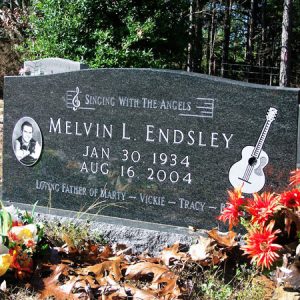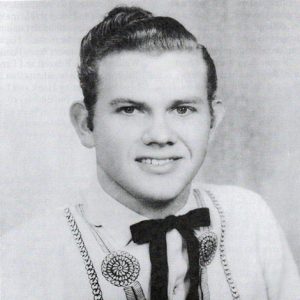calsfoundation@cals.org
Melvin Endsley (1934–2004)
Melvin Endsley of Drasco (Cleburne County) was a musician and songwriter most noted for writing both the words and music of “Singing the Blues,” one of the biggest hits of the 1950s and one of the most recorded songs of the twentieth century. Nashville, Tennessee, recording star Marty Robbins, pop singer Guy Mitchell, and teen idol Tommy Steele in the United Kingdom all recorded versions of the song. Endsley composed more than 400 songs, many of them recorded by the top musical artists of the day, including Andy Williams, Johnny Cash, Paul McCartney, Ricky Skaggs, Stonewall Jackson, Black Oak Arkansas, Bill Haley and His Comets, and Don Gibson.
Melvin Lorenzen Endsley was born on January 30, 1934, in Heber Springs (Cleburne County) to Frederick Dell (Fred) Endsley and Bessie B. Griffin Endsley. He became physically handicapped at the age of three as a result of a near-fatal bout with polio, which left him with a withered right arm and unable to walk. Endsley listened to radio broadcasts from the Grand Ole Opry during the two years he spent in a children’s hospital in Memphis, Tennessee, and developed a love for the music. He was particularly impressed by Wayne Raney of Wolf Bayou (Cleburne County) and the Delmore Brothers, who had a radio show in Memphis. In the hospital, Endsley taught himself to play guitar to accompany his vocals; the guitar was given to him by a nurse who was impressed by his singing and writing. While the effects of the polio prevented him from forming chords with his right hand, he was able to play the open tunings labeled “radio friendly” by disc jockeys.
Endsley attended high school in Concord (Cleburne County), graduating in 1954. His main ambition was to become a recording star. He wrote “It Happens Every Time,” later recorded by Don Gibson and Dorsey Burnette, as well as “Singing the Blues,” as a young man. He started performing on radio station KWCB in Searcy (White County) every Saturday afternoon on Wayne Raney’s Jamboree. He also performed on KCON in Conway (Faulkner County).
From his reading of the magazine Country Song Roundup, he was savvy about song publishing and spent a few dollars to have his songs copyrighted. He was determined to get a Nashville recording artist to listen to his songs. While he was waiting to pitch his music to country and rockabilly star Webb Pierce, Marty Robbins walked by. Robbins, who was a fairly new artist himself, was interested in finding fresh material that suited his style of singing. He especially liked “Singing the Blues” and took Endsley to see his friend and publisher, Wesley Rose of the Acuff-Rose publishing company, which was quickly becoming one of the biggest music publishing businesses in America. Rose liked what he heard and quickly signed a contract with Endsley.
“Singing the Blues” (1956) was an important milestone in Robbins’s career. He had had some recording success previously, but Endsley’s song put him over the top. “Singing the Blues” has been recorded by more than 100 artists. Ford even used the song for a television commercial promoting the Edsel, in which Fred and Ethel Mertz—played by Vivian Vance and William Frawley—did the singing.
Unfortunately, Endsley did not share in much of this success, despite his talent for writing catchy lyrics and melodies. His follow-up to “Singing the Blues” was a well-written song called “Knee Deep in the Blues” (1956), also recorded by Guy Mitchell and Tommy Steele. The song was a hit, but not the big hit Endsley was seeking. “I Like Your Kind of Love” (1957), recorded by Andy Williams, was also a hit, but a minor one. “Love Me to Pieces” (1957), recorded by Jill Corey, Janise Martin, and Janet Eden, also received much airplay. Gradually, the hits played out, and recording artists lost interest in Endsley’s new material. His last major songwriting success came in 1960 when country singer Stonewall Jackson released “Why I’m Walking,” which reached number six on the country charts.
After the success of “Singing the Blues,” Endsley began spending time promoting his own musical career as a singer and recording artist. He first signed with RCA, where Chet Atkins was in charge of production and often played backup and lead guitar. RCA quickly released two recordings by Endsley: “I Ain’t Gettin’ Nowhere with You / Bringin’ the Blues to My Door” and “I Like Your Kind of Love / Is It True” (1956). Endsley’s left foot was paralyzed, so he was able to use his right foot for gas and brake, but the long trips from Drasco to Nashville were tiring, even though he had a driver who took over occasionally. It was also difficult for him to make personal appearances on stage. RCA was busy promoting its major recording artist, Elvis Presley, and had little time left to promote Endsley, being mainly interested in his songwriting ability. RCA was slow to promote Endsley’s records, and his two recordings fell by the wayside. Endsley left RCA for the MGM label, where Wesley Rose worked with him on three recordings. The three records did not do well, and after a year, his contract was not renewed.
Endsley married Carolyn Matthews on March 15, 1960; they had four children.
For a time, Endsley continued to work with Wesley Rose on the smaller Liberty label, owned by Acuff-Rose. After four unsuccessful record releases, Endsley was with Marty Robbins’s publishing company for a time and then started his own label, called Mel-Ark, on his farm at Drasco. By 1970, Endsley had decided to return to the large ranch house he built with money from “Singing the Blues,” about a mile from his beloved Drasco, quitting the music business. He farmed and raised chickens until his death from heart problems on August 16, 2004. Endsley is buried in Sipes Cemetery at Drasco. In 1998, he was inducted into the Arkansas Entertainers Hall of Fame.
For additional information:
Barger, Carl J. Cleburne County and Its People, Vol. 2. Bloomington, IN: AuthorHouse, 2008.
Escott, Colin. Tattooed on Their Tongues: Journey through the Backrooms of American Music. New York: Schirmer Trade Books, 2000.
“Melvin Endsley.” Allmusic.com. http://www.allmusic.com/artist/melvin-endsley-mn0000411617 (accessed November 6, 2020).
Taylor, Heber. “Singing the Blues.” Arkansas Democrat-Gazette, Three Rivers Edition, September, 21, 2003, p. 1S.
Kenneth Rorie
Van Buren, Arkansas
 World War II through the Faubus Era, 1941 through 1967
World War II through the Faubus Era, 1941 through 1967 Melvin Endsley Gravestone
Melvin Endsley Gravestone  Melvin Endsley
Melvin Endsley 



My dad, Jimmie Douglas Grimes, was a good friend of Melvin’s who drove him to sing for Marty Robbins on that first meeting.